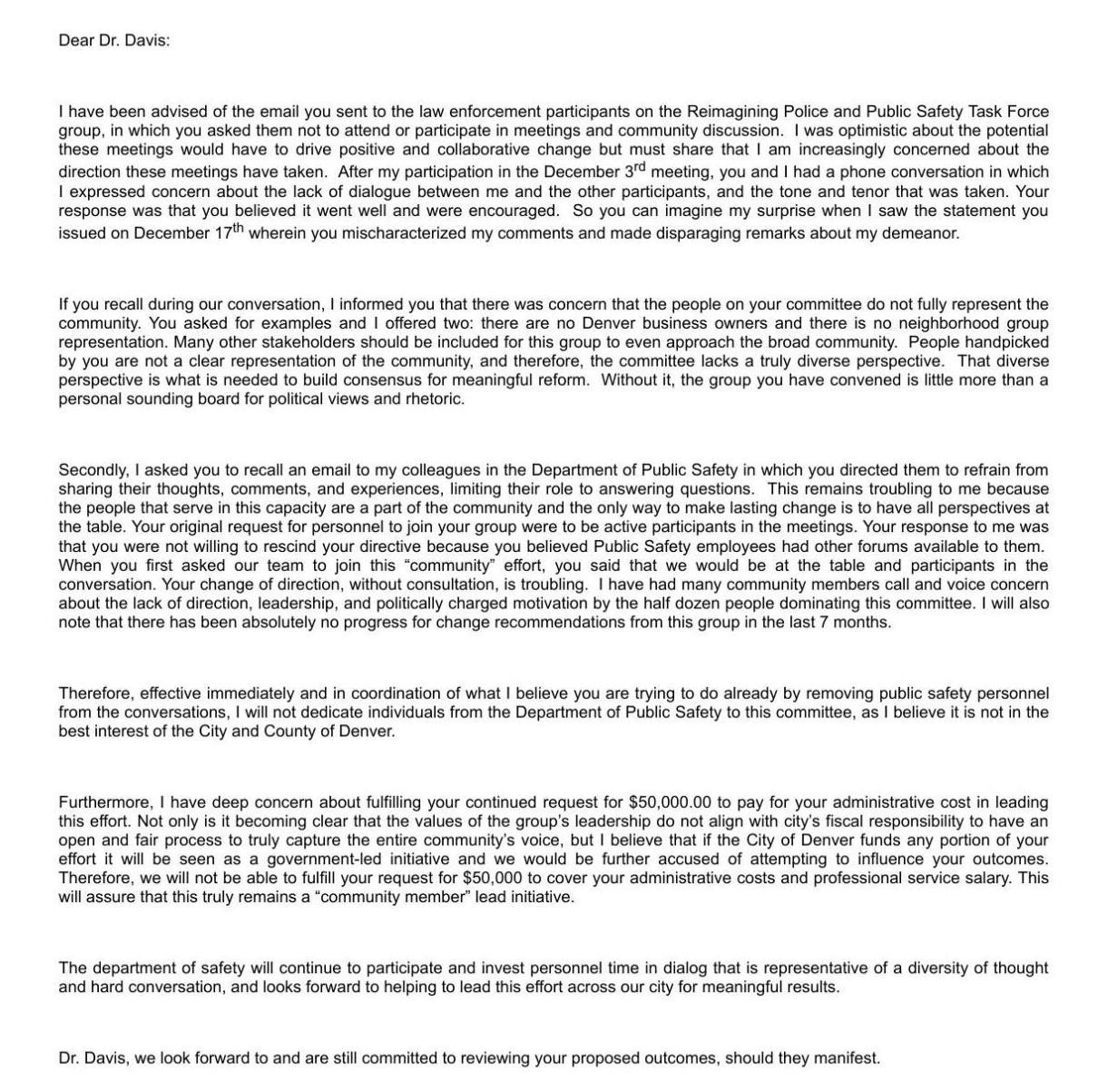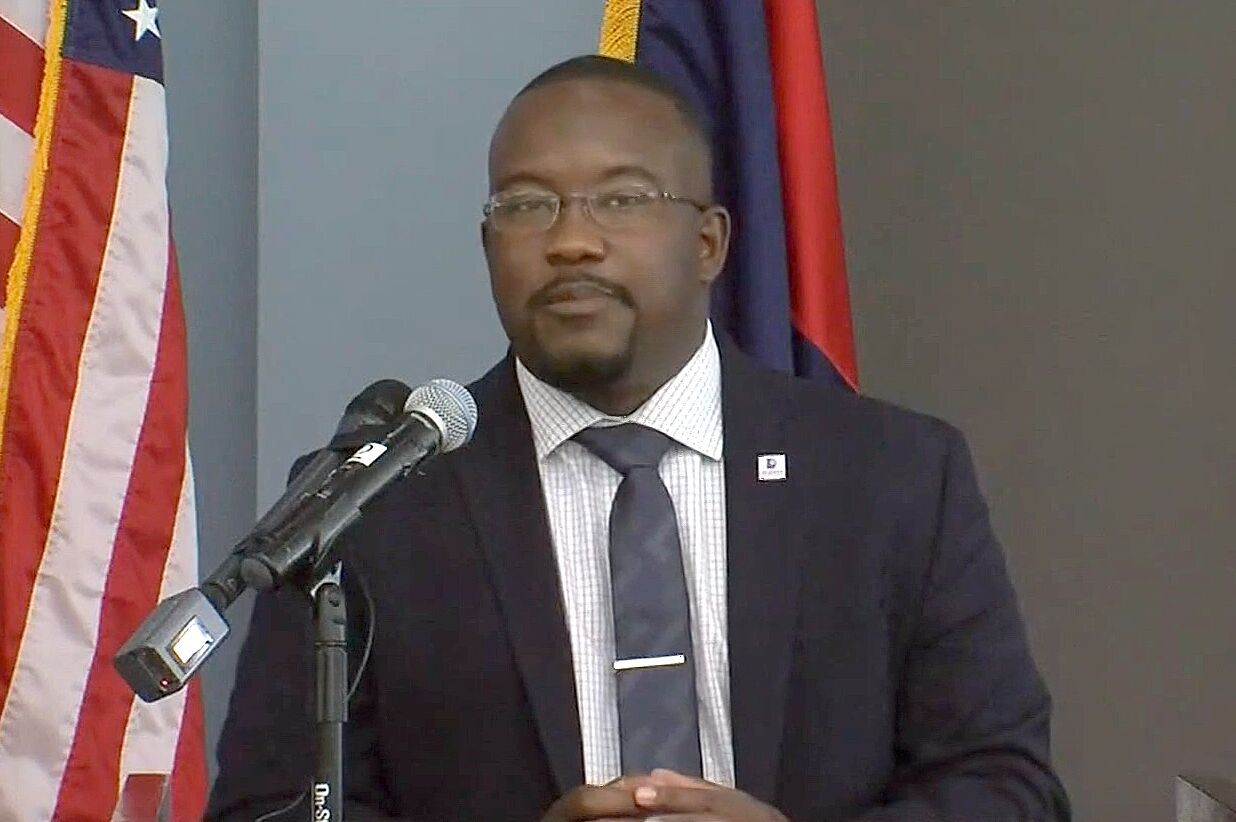EXCLUSIVE: Public safety director tells why law enforcement officials ditched the ‘reimagine policing’ group
Seven months after a “reimagining policing” task force was formed to address charges of excessive force by Denver police, the head of public safety has withdrawn law enforcement representation from the community-led group.
Denver Public Safety Director Murphy Robinson, who in mid-June committed to “systematic and strategic transformation in the criminal justice system,” argues that the Reimagine Policing and Public Safety Task Force meetings have moved in the wrong direction.
He directed his disapproval toward Robert Davis, the group’s leader, in a Jan. 13 email, in which he announced that he and Denver Police Department officials were pulling out.

A factor behind his decision, Robinson said in an exclusive interview, is that shortly after the task force began holding meetings, Davis asked Robinson’s team “to not participate as participants on the committee but to be there to answer questions only — and pretty much speak when spoken to.
“That gave me pause, and I was not happy about that, because you cannot hear diversity of thought when you are stifling the conversation and having just certain folks speak.”
Davis, however, refutes Robinson’s account. Safety officials were only asked to skip one meeting in early January, he said, to give community members the chance to speak “freely” about their ideas on policing and public safety and the direction in which the task force should head.
However, Robinson said that when he spoke to the task force about the “complexity” of public safety during a recent meeting, members accused him of “traumatizing” them.
“I felt ambushed,” he said. “I felt that there was no dialogue.”
The public safety director’s view, Davis said in a phone call, is an “extreme misunderstanding and exaggeration of how law enforcement was asked to be respectful of community voice.”
But Robinson points to the change in direction that the Citizen Oversight Board has taken since being directly involved with the task force early on.
The COB “told me that they were no longer going to participate in the group,” Robinson said, “that they didn’t like the direction that it was headed, which also gave me pause.”
Al Gardner, who chairs the COB, told Colorado Politics that they moved into an advisory role. He said he thought it would be best if his group served as an “ally” or “sounding board” to ensure its gaze remained focused on “policy efforts that help to advance and improve” the role of the independent monitor “instead of taking a shotgun approach and being involved in everything.”
Robinson said he found the flurry of ideas and lack of deliverables from the task force worrying, causing him to rescind the offer of a $50,000 taxpayer-funded grant that would have helped cover the task force’s expenses. Furthermore, the group had already received two other grants from the Caring for Denver Foundation and the Rose Community Foundation. Dollars are needed, Davis said, “to help with our facilitation team, to take care of some things that we need done around technology, administrative assistants, etcetera.”
Davis insists that the task force is still on schedule to produce a list of recommendations to city officials in March, a deliverable he said he made clear in his grant proposal to city officials.
Robinson also has taken issue with the fact that, of the 40 groups Davis says are enlisted in the task force, there are no business owners and registered neighborhood organizations.
Davis stressed that he did not choose the members of the task force, but that they were chosen by community members who attended the town hall meetings in June and July and through a community survey.
The task force, once convened, then sought suggestions from Denver City Council members and Mayor Michael Hancock’s office to help identify who was still missing from the table.
Davis said not a single city official suggested a business group or registered neighborhood organization, and therefore their representation was not pursued.
“I don’t foresee it being a problem,” Davis said. “I believe that the voices that we do have at the table really understand the issues that the city is facing around policing and public safety. I believe that the voices that are most impacted and most informed about policing and public safety are at the table.”
District 9 Councilwoman Candi CdeBaca, who has been involved in the task force since its first meeting, defends the makeup of the group’s membership, though she said there was “initial pushback to council members attending.”
Since then, several council members — including safety committee chairman Paul Kashmann, Jolon Clark, Robin Kniech and Amanda Sawyer — have been “consistently represented” either directly or through a staff member, said CdeBaca, who attends every meeting, along with her chief of staff and former Denver mayoral candidate, Lisa Calderón.
“There has been everyone here,” CdeBaca said, the “public defender’s office, STAR (Support Assisted Response Team), RTD members, youth, providers, ACLU, cops, retired cops, faith leaders — you name it.”
No matter who’s been at the table, Robinson said, the point is that “seven months have gone by, and nothing’s happened.”
Still, he says, he and leaders with the Denver Police Department remain open to the task force’s recommendations and will “absolutely take a look” at them when the list is submitted.
With Denver law enforcement’s presence now absent from the resident-led task force, Robinson said he looks forward to working with his own team in his newly established Criminal Justice Transformation and Policy Office on short-term and long-term plans “in terms of what we can do to move the needle on some of these efforts” in a way that represents all interests.
“I’m working with the mayor’s office, members of council and our community to really start up our process again about … getting real stakeholder involvement for what we can do for reform of the entire criminal justice system,” he said. “I think that’s what’s missing with the Reimagined group; it feels very exclusive, and we’re trying to be very inclusive with the community.”





